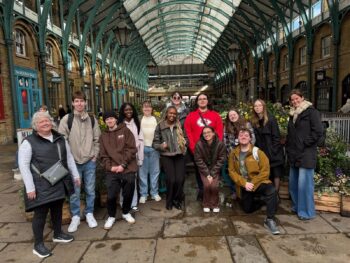
The 2025 London Study Abroad group pose in Covent Garden, London.
It was that time of year again when some of DMACC’s very own set off across the pond, immersing themselves in the culture and vibrant city life of London during the annual Study Abroad program.
Headed by Professors Kate Rice (Psychology) and Beth Baker-Brodersen (English/Humanities), the 10-week program included two weeks of preparation in the U.S. followed by eight weeks in London. It offered students a chance to expand their academic knowledge while experiencing British culture firsthand.
Students arrived in London on Saturday, February 8, and wasted no time getting acquainted with their surroundings.
“We finished orientation and our first tour of the city. Big Ben was great but had competition, as right after, we saw Mark Wahlberg filming a movie,” Rice shared. The group also witnessed farmers protesting an inheritance tax, an interesting callback for a sight familiar to Iowans.
Their first week wrapped up with a day trip to Brighton, a coastal city often called “London by the Sea.” According to Rice, the students quickly adapted to their environment.
“The students were definitely making DMACC proud—learning to navigate the city, embracing curiosity, and learning while doing it in an ‘Iowa Nice’ way.”
Carson Oakes, one of the students on the trip, reflected on his time abroad, noting the city’s size and complexity. “London was so much larger than I could have imagined. Even though we explored a lot, I felt like I only saw about 15% of what it has to offer.” He was especially struck by the number of attractions within close proximity, saying, “A short distance away from the building where we held our classes was a long road that had three extremely large museums… and all of them were right next to each other.”
One of the program’s highlights was a visit to the Freud Museum, a unique opportunity for psychology students. All students took a British Life and Culture course that was led by a local instructor, which included visits to landmarks such as the Victoria and Albert Museum.
Students stayed with host families and had opportunities to join clubs at Imperial College, deepening their cultural engagement. From riding the Tube to exploring world-class museums, everyday life in London became a key part of the educational experience.
Cultural changes, however, weren’t always easy. Oakes noted one of the most jarring differences: “People in London aren’t as talkative. Back in Iowa, I’m used to making small talk with strangers, but in London, people seem more focused on getting where they need to go without distractions. There’s also a strong social norm to remain quiet on public transportation.”
Rice acknowledged those challenges. “I think a transition would just be oftentimes from—even if it’s a city like Des Moines or rural areas—to the larger [city],” she said. “And then, of course, missing family and friends. Technology can definitely help with that.”
To help with the adjustment and ensure safety, the program included multiple orientations and a 24-hour emergency contact system.
Despite the shift in pace and culture, Oakes described the experience as life-changing. “The trip was the greatest experience of my life,” he said. “Being in a place you’ve never been before for eight weeks with completely different cultural norms can make anyone feel uncomfortable, but that forces you to try and learn and adapt so that you don’t feel that uneasiness. Learning to overcome that sense of unease on your own is one of the greatest feelings… You will have a newfound level of confidence and self-efficacy that is almost impossible to feel anywhere else.”
He also commented on the constant activity in the city. “In Iowa, it feels like there’s not much going on, but in London, it felt like there was always something happening,” he said, citing Broadway shows, concerts, and museums.
Looking ahead, both faculty and students hoped the experience would stay with participants well beyond their return. “I really hope it helps them in the process of self-discovery and developing confidence,” Rice said. “In psychology, we call it self-efficacy—knowing that when you do something difficult, that you’re more willing to know that you can do it again.”
Oakes strongly encouraged future students to consider the program. “It’s the most holistic learning experience you’ll ever have,” he said. He also recommended the optional field trip to Scotland, calling it “one of the best parts of my trip,” and advised students to explore as much of London as possible and even consider weekend trips to other countries.
His final reminder: stay alert. “London has a significant pickpocketing issue,” he warned. “Be aware of your surroundings, especially in busy areas.”
For the 2026 trip, keep an eye out for informational sessions and application deadlines this fall.





Comments